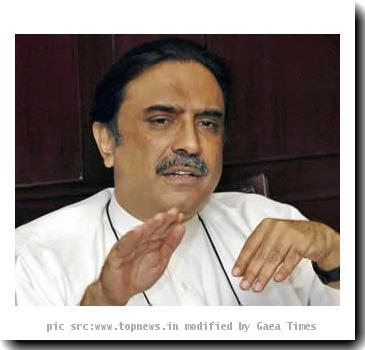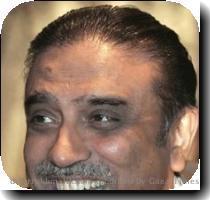Karachi wracked by spate of targeted killings, reflection of problems throughout Pakistan
By Ashraf Khan, APSunday, June 27, 2010
Pakistan’s Karachi wracked by spate of killings
KARACHI, Pakistan — Asif Raza and his brother were killed days apart and in the same manner: gunned down on the streets of Pakistan’s largest city. Their relatives insist the pair was targeted by Sunni extremists only because they were Shiites.
Around the same time, Rizwan Qadri, a Sunni, was killed when he stopped by a betel leaf shop on his way home. His killers are presumed to be either Shiite extremists or members of a powerful political party that has been linked to many deaths in the city.
Close to half of the 600 murders reported so far this year in the economic hub of Karachi have been “target killings,” slayings carried out by religious groups and gangs affiliated with political parties. That’s roughly double the number that occurred in all of 2009.
The surge is symptomatic of the lawlessness that has long plagued this teeming southern port city of 18 million, where police are ineffectual, religious tensions run high and politicians exploit ethnic divides.
But the uptick is violence is particularly worrying these days as it is a reflection of the problems that plague Pakistan in general, where a weak government is often no match for the volatile mix of ethnicities and religious sects that compete for power and loyalty.
“Successive political governments with conflicting political interests, fragile policies and weak political determination and will were not able to deal with the cancerous disease of sectarianism, ethnicity and the mafias,” Imtiaz Ahmed, a former intelligence chief, said of Karachi’s problems.
In Pakistan, though, an increase in urban crime is never just a local problem.
The city’s chaos provides cover for the growing number of Taliban and al-Qaida militants looking for a hide-out beyond the northwest tribal regions under siege by army operations and U.S. missile strikes. The Taliban’s No. 2 leader, Mullah Abdul Ghani Baradar, was arrested in Karachi in February, and other members of the militant group’s top leadership council are believed to spend time in the city.
It is also threatening to undercut confidence in the U.S.-allied government bogged down in a war against those Islamist extremists.
Asif Raza, a 37-year-old accountant, was killed on June 11 as he traveled to work. He had promised his 11-year-old son he would buy him a new BMX bicycle on his return, according to his widow, Shagufta, who could barely speak because of her tears.
“The killers are the enemies of the Shiites,” said Syed Ali Raza, another of Asif’s brothers. “We wonder about our survival and how we get back to our homes safe and secure in the evening.”
Police have lodged a case alleging unknown assailants were behind the attack, but the family has no hope for justice.
On the same day, in another corner of this crowded city where millions live in slums, Qadri was gunned down. He was a member of Sunni Tehreek, a moderate Sunni group that is not believed to have links to extremism.
Members of the group have been targeted in the past by both Shiite extremists and members of the Muttahida Quami Movement, the most powerful political party in Karachi.
Qadri’s death underlines the difficulty of tracing the cause of many killings in Karachi, where sectarian and political tensions, as well as criminal impulses, all fuel violence. The only thing that binds the deaths is the inability or unwillingness of authorities to stop them.
The religious violence that courses through the city is so pervasive that many of its thousands of mosques are locked outside of prayer times. Battles have not only broken out between the country’s main Sunni sect and minority Shiites. Fighting among different schools of Sunni Islam is also common.
Over two dozen Shiite Muslims have been killed this year, according to data collected by the Citizen Police Liaison Committee, a public-private sector crime watchdog and monitoring organization. A dozen Sunnis, most members of the extremist Sipah-e-Sahaba group, were also gunned down.
Most people trace the origin of the conflict to two events in the 1980s that helped changed the nature of what has always been Pakistan’s most cosmopolitan city. First, the U.S.-sponsored war against Soviet occupation in Afghanistan triggered a flood of weapons into the region, as well as refugees.
At the same time, dictator Gen. Zia ul-Haq oversaw a decade of “Islamization” of Pakistan, seeking to remodel the country along the lines of Saudi Arabia, which along with the United States supported his rule. Thousands of hardline Sunni religious schools that promoted anti-Shia beliefs were established, with Karachi home to many of them.
The religious tensions have been allowed to fester as ineffectual leaders either ignore or exploit them in their quest for power — much as they have with ethnic divides.
Many killings have been linked to gangs controlled by the city’s main political parties, which have been feuding for much of the last 20 years. The two parties most linked to the violence have their electoral bases in different ethnic groups that make up a large chunk of the city’s population.
The Muttahida Quami Movement claims to represent the Urdu-speaking descendants of those people who came to Karachi soon after the birth of Pakistan. It is secular and likes to speak out against the so-called Talibanization of the city, a jab at the Awami National Party, which represents the ethnic Pashtuns from the Taliban heartland in the northwest.
Activists of the Pakistan People’s Party, which runs the federal government, and other parties also allegedly take part in the killings.
President Asif Ali Zardari has promised to establish peace in Karachi at all costs. But many analysts and commentators said the federal government needs to take concrete steps to rein in the various political parties and dismantle sectarian groups that are banned but are often allowed to operate openly.
“Tough words need to be backed by solid action, and if those tasked with maintaining peace aren’t capable of doing so, perhaps more capable individuals can be given the job,” said a recent editorial in Pakistan’s leading English-language newspaper, Dawn.
Tags: Asia, Asif Ali Zardari, Karachi, Middle East, Municipal Governments, North America, Pakistan, Political Organizations, Race And Ethnicity, Religious Issues, Religious Strife, Saudi Arabia, South Asia, United States

